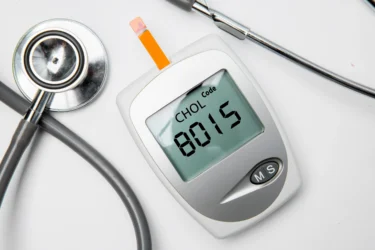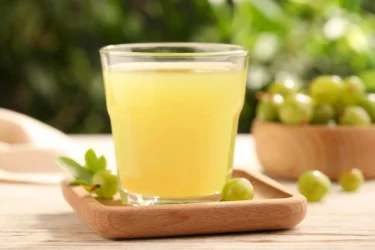Amla Juice: Uses, Benefits, Side Effects and More!
By Dr Rajeev Singh +2 more

Get,

to manage your symptom
Get your,


4 Cr+ families
benefitted

OTP sent to 9988776655



You’ve successfully subscribed to receive
doctor-approved tips on
Whatsapp

Get ready to feel your best.

Hi There,
Download the PharmEasy App now!!


Register to Avail the Offer
Send OTPBy continuing, you agree with our Privacy Policy and Terms and Conditions

Hi There,
Sign up on PharmEasy now!!
Trusted by 4 crore+ families

OTP sent to 9988776655



You have unlocked 25% off on medicines




Code: NU25
By Dr Rajeev Singh +2 more
Table of Contents
You might have heard your grandmother or other elderly family members rave about how good amla may be for your health. It is mentioned as a remedy for so many ailments in folk medicine that it almost feels like a myth. You might even doubt its real medical potential. But it may be true! Amla may be considered as a wonder herb and might be used for treating many problems. It may be regarded as a precious gift of mother nature to human health. Isn’t it astonishing to know that one herb might have numerous applications? Ancient Indian mythology seems to have similar beliefs it is believed that amla was the first tree to be created in the universe1.
Amla or Indian gooseberry is known as Embelica officinalis scientifically. It is native to India and can also be found in Sri Lanka, Southeast Asia, Pakistan, China, Uzbekistan and Malaysia, which are tropical and subtropical regions. There is wide use of amla in Ayurveda to treat many conditions as it is rich in various vitamins and minerals. Besides the fruit, the seeds, bark and leaves may also be used for multiple purposes1.

Amla is a good source of vitamin C and is also known for its high fibre content. There are other bioactive components present in amla too1. The nutrient profile of amla is as follows:
Nutritional profile of amla juice2
From my knowledge, as a matter of fact, amla contains phytonutrients and antioxidants that are believed to help with memory by combating free radicals, that are known to assault and destroy brain cells. I strongly recommend the consumption of amla juice in moderation for maximum benefits4.
Dr. Siddharth Gupta, B.A.M.S, M.D (Ayu)
Amla may have many properties. Some of the potential properties of amla juice are stated below:

It is hypothesised that oxidative stress might cause heart diseases to occur. In animal studies, it was found that amla juice might help lower the level of reactive oxygen species in the body and may help decrease oxidative stress, thereby it may be helpful for heart diseases. As the elements which might cause heart diseases might be potentially removed, it might be helpful for heart health. However, there is a need for studies on humans to state it as a fact1. Disease of the heart should be diagnosed and treated by a doctor, so ensure that you consult a doctor.

Amla has a high vitamin C content, which might contribute to its anti-diabetic property. Studies have shown that amla juice might have the potential to reduce blood sugar and it may promote the production of insulin. However, in animal studies, a herbal composition containing amla and other compounds like Guduchi (Tinospora cardifolia) and fenugreek (Trigonella foenum) did not cause much lowering of blood sugar. The use of other herbal preparations also showed only a small reduction in blood sugar levels. Therefore, though there are studies that might prove amla’s effectiveness in lowering blood sugar, the results are not consistent. So, there is a need for more human studies1. Diabetes is a serious condition and should be diagnosed and treated by a doctor. Kindly consult a doctor.

Amla juice might be helpful for cancers and might help to stop it from growing and spreading. It might have the potential to curb the growth of cancer cells in various cancers such as that of the breast, stomach, liver, uterus, and pancreas. It might help the cells against the harmful effects of chemotherapy and radiation therapy, owing to its potential antioxidant and radioprotective (protects our cells from harmful radiation) activity. Amla might be a valuable tool for cancer treatment in the future1. However, extensive research is required to prove the above-mentioned claims. Therefore, you should consult a doctor.

As amla is a natural source of vitamin C and contains a few components like gallic acid which might exhibit antioxidant properties. Owing to this property, amla might act as a scavenger for free radicals in the body and neutralise them, which might potentially cause a reduction of oxidative stress. Oxidative stress is a cause of many diseases. The potential use of amla for conditions that result due to increased oxidative stress (like diabetes, cancer, etc.) may be attributed to its antioxidant activity. Amla may also help with redox homeostasis i.e., the capacity of cells to deal with stress and toxic substances1. However, more research is required to state the potential use of amla juice for oxidative stress.

Amla might play a role in reducing blood cholesterol levels. It might potentially act in different ways:
These actions might be why consumption of amla may show a decrease in blood cholesterol, triglyceride and LDL (Low-Density Lipoprotein) levels1. However, more research is required to ascertain the potential use of amla juice for cholesterol. Please consult a doctor before using amla juice for its potential health uses.

Apparently, amla might give strength to the body and energise it. It might help with various infections and diseases. These are the factors that might contribute to the possible anti-ageing effect of amla. Amla may also have potential use for hair and skin health. Thus, amla might have some effect on youthfulness, staying healthy and full of energy1. However, more research is required to prove these claims.

Amla might help the liver from getting damaged by certain toxic substances. The possible liver-protective action of amla may be due to its action as an antioxidant as it may nullify free radicals that might cause inflammation. Animal studies have shown that amla juice might help the liver from getting damaged due to alcohol consumption. It may also help with the severity of liver fibrosis (hepatic fibrosis) caused by toxic substances. In addition to these effects, amla might also help in the proper functioning of the liver1.
However, more studies are required to prove such claims. Moreover, liver diseases can be serious and should be diagnosed and treated by a doctor. Kindly consult a doctor.

There are various other potential uses of amla juice. Some of them are:
Though there are studies that show the potential use of amla juice in various conditions, but these are insufficient and there is a need of further studies to establish the true extent of benefits of amla juice on human health.
Studies have revealed that amla’s high Vitamin C content may aid in the production of norepinephrine, a neurotransmitter which is thought to boost brain function in dementia patients. I suggest one dealing with dementia should consider consuming amla juice after discussing with their doctor4.
Dr. Rajeev Singh, BAMS
Amla juice is easily available in the market. Alternatively, you can extract fresh juice from the fruits of amla to reap maximum antioxidant benefit from it. However, a doctor must be consulted for use as a medicine for specific conditions. Your Ayurvedic physician will prescribe you the form and dosage as per your health condition.
You must consult a qualified doctor before taking any herbal supplements. Do not discontinue or replace an ongoing treatment of modern medicine with an ayurvedic/herbal preparation without consulting a qualified doctor.
There are no credible sources claiming the specific side effects of amla juice. However, if you notice any allergic reactions or other symptoms occurring because of consuming it, please seek medical advice. Though there have been no reports of anaphylaxis, in case you notice a swelling of the face, throat or any other body part and have trouble in breathing, it may be due to an acute allergic reaction called anaphylaxis.
You should immediately contact an ambulance and go to a doctor if you are ever in such a condition. Kindly do not self-medicate, replace, alter or discontinue any ongoing treatment on your own. Ensure that you consult a doctor.
Also Read: Blueberries: Uses, Benefits, Side Effects, And More!
General precautions need to be taken before drinking amla juice. You should follow the dosage and way of use as recommended by your doctor. However, you need to be more precautious if:
Ensure that you follow your doctor’s prescription and recommendations. Do not self-medicate, replace, alter or discontinue any ongoing treatment by yourself.
Also Read: Curry Leaves: Uses, Benefits, Side Effects and More!
Adverse reaction of amla juice with any other drug has not been reported. However, it may react with a few medications. So, make sure that you disclose all the medicines that have been prescribed to you for use when you consult an Ayurvedic physician. They will tailor their prescription to suit your health needs.
Also Read: Tamarind: Uses, Benefits, Side Effects and More!
Amla juice might be helpful for jaundice. Amla juice made along with munnakkas might be prescribed by your Ayurvedic physician as it is known to be beneficial for jaundice1. However, the choice of treatment is at the discretion of your doctor basis your consultation with them.
Amla juice might be helpful in the treatment of diseases. Amla juice is used widely to have potential uses for a range of diseases like diabetes, scurvy, cold, cough, ulcers, etc1. However, more research is required to prove such claims.
Amla juice might help with the symptoms of dysentery. Amla juice made by adding lemon juice and mishri can help with dysentery1. However, more research is required to prove the potential use of amla juice for dysentery. Moreover, you should consult a doctor before using amla juice as a medicine for human health.
Amla juice might be helpful for anaemia. It might help to absorb iron, which may be helpful for iron deficiency anaemia1. There is a need for more research on this subject. Please consult a doctor who will diagnose if you have anaemia and treat it. Do not self-medicate.
Amla juice might be good for hair as it might help with hair growth and may stop premature greying of hair1. However, more research is required on this subject.
Amla juice might help with piles1. However, more research is required to prove such claims. Piles can be a serious problem, so ensure that you consult a doctor. Kindly do not self-medicate, replace, alter or discontinue any ongoing treatment.
Disclaimer: The information provided here is for educational/awareness purposes only and is not intended to be a substitute for medical treatment by a healthcare professional and should not be relied upon to diagnose or treat any medical condition. The reader should consult a registered medical practitioner to determine the appropriateness of the information and before consuming any medication. PharmEasy does not provide any guarantee or warranty (express or implied) regarding the accuracy, adequacy, completeness, legality, reliability or usefulness of the information; and disclaims any liability arising thereof.
Links and product recommendations in the information provided here are advertisements of third-party products available on the website. PharmEasy does not make any representation on the accuracy or suitability of such products/services. Advertisements do not influence the editorial decisions or content. The information in this blog is subject to change without notice. The authors and administrators reserve the right to modify, add, or remove content without notification. It is your responsibility to review this disclaimer regularly for any changes.
Comments

Leave your comment...
You may also like
Comments